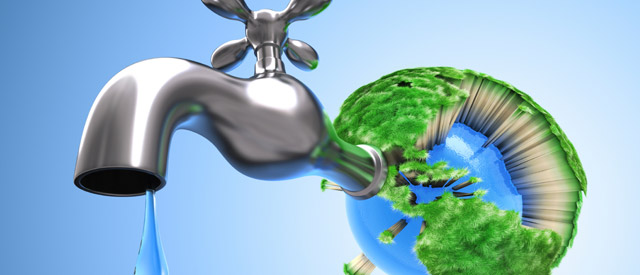 Middle East: Experts urge governments to revise water policies
Middle East: Experts urge governments to revise water policies
Governments in the Middle East must put aside political differences, rethink water management and revise strategy and policy in using water otherwise the region will face a dire future, scientists have warned at an international conference in Jordan.
The 1-4 February Amman conference is entitled Food Security and Climate Change in Dry Areas.
Scientists said the region can no longer afford to waste water, with global warming expected to exacerbate an already existing problem.
"We are still practicing water management in the same way when the water was not scarce and that is the point. Now it is time to revise all water management concepts in the region, because water scarcity [has] reached the point of being chronic," said Theib Y. Oweis, director of the water and land management programme at the International Center for Agricultural Research in the Dry Areas (ICARDA).
"We cannot afford to use water as we use it now. Unless we start revising everything, we will come to a point where we will not have water to use for agriculture," Oweis told IRIN on the sidelines of the conference.
Dozens of experts from around 30 countries are taking part in the conference organized by Jordan's Ministry of Agriculture, the National Centre for Agricultural Research and Extension, ICARDA and other partners.
Oweis said water policies in the region do not give water the value it deserves, thus putting at risk strategic reserves for future generations.
"Even now water is more valuable than oil; water is life but oil is not. With water getting scarcer people will feel the value. One of the problems is that policies of regional countries do not value water," he said.
Water pricing
Eddie Bethel, head of ICARDA's Geographic Information Systems (GIS) unit, said: "The predictions for the near future are dire for the entire Mediterranean region. There is a significant increase in temperature and a decrease in precipitation. For the medium future we can expect serious difficulty in the availability of water in improving agriculture in the region".
According to a report entitled The Regional Impacts of Climate Change: An Assessment of Vulnerability, by the Intergovernmental Panel on Climate Change (IPCC), water shortages, already a problem in many countries of Arid Western Asia (including the Middle East), are unlikely to be reduced, and may be exacerbated, by climate change. Changes in cropping practices and improved irrigation could significantly boost the efficiency of water use in some countries.
Bethel called on regional countries to introduce some new tools to tackle the problem. "They will have to learn to save water. There is a lot of waste in this region," he said.
"For example to put a price on water is one of the policy options that are difficult to discuss but most likely to become necessary. Pricing for water will encourage farmers to grow less water-demanding crops and put [in] irrigation systems that are more efficient," Bethel said.
ICARDA's Oweis called on individual countries to manage the little water they have in a more efficient way.
| Contact information |
Co-Chair of the Local Organizing Committee: Dr Nasri Haddad, ICARDA, P.O. Box 950764, Amman, Jordan
(email: n.haddad@cgiar.org ; m.saxena@cgiar.org) Phone: Fax: (+962 6) 5525930 |
|---|---|
| News type | Inbrief |
| File link |
http://www.zhouxinxin.com/2010/02/middle-east-experts-urge-governments-to.html |
| Source of information | IRIN |
| Keyword(s) | water policies, Food Security, Climate Change, Dry Areas, Water pricing, GIS |
| Subject(s) | FINANCE-ECONOMY , METHTODOLOGY - STATISTICS - DECISION AID , POLICY-WATER POLICY AND WATER MANAGEMENT , RISKS AND CLIMATOLOGY |
| Relation | http://www.icarda.org/Announcement/2009/IntlConfrnc_FoodSecurity/FoodSecurityAndClimateChangeInDryAreas_2009.htm |
| Geographical coverage | Jordan |
| News date | 04/02/2010 |
| Working language(s) | ENGLISH |
 you are not logged in
you are not logged in





